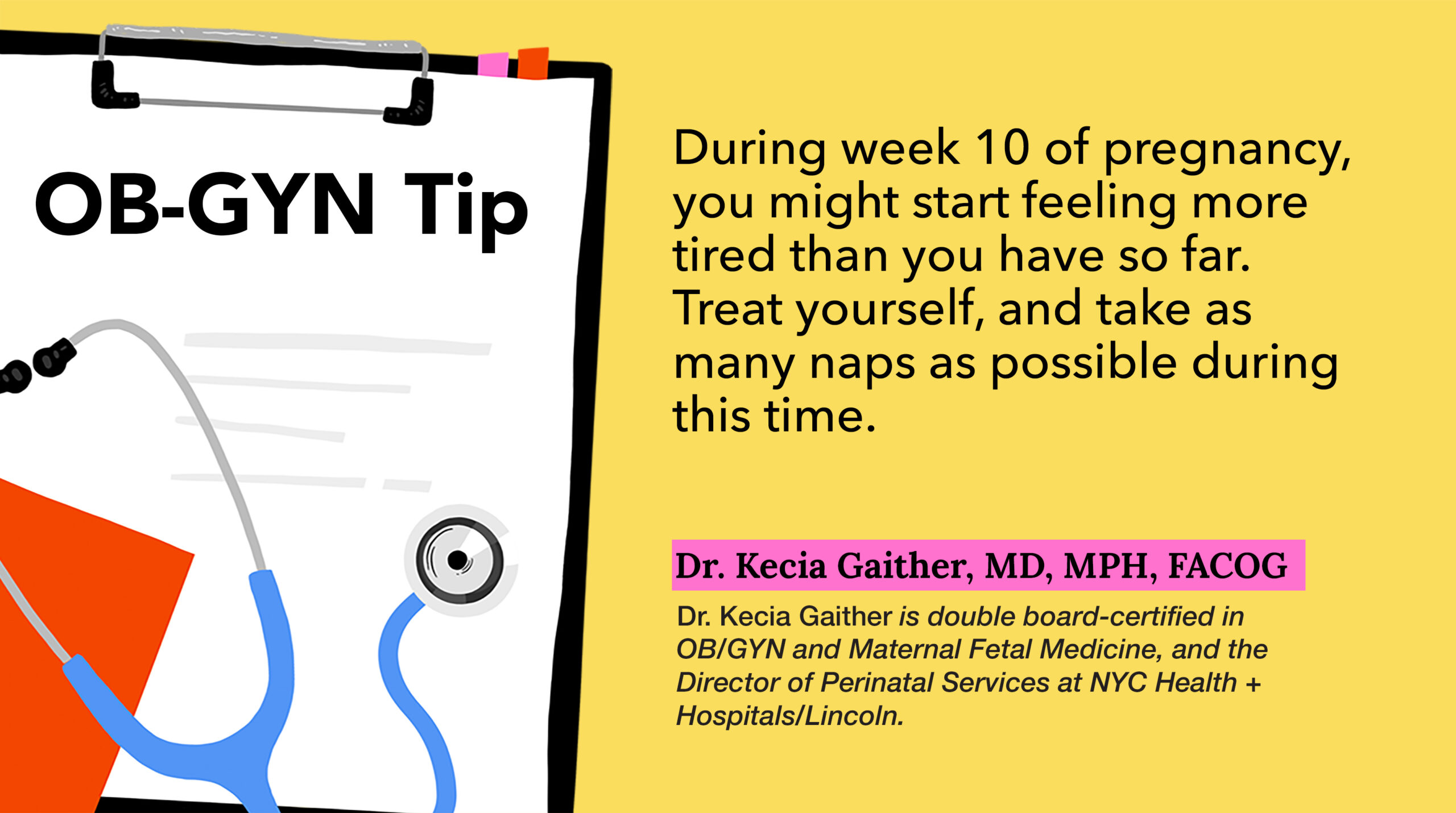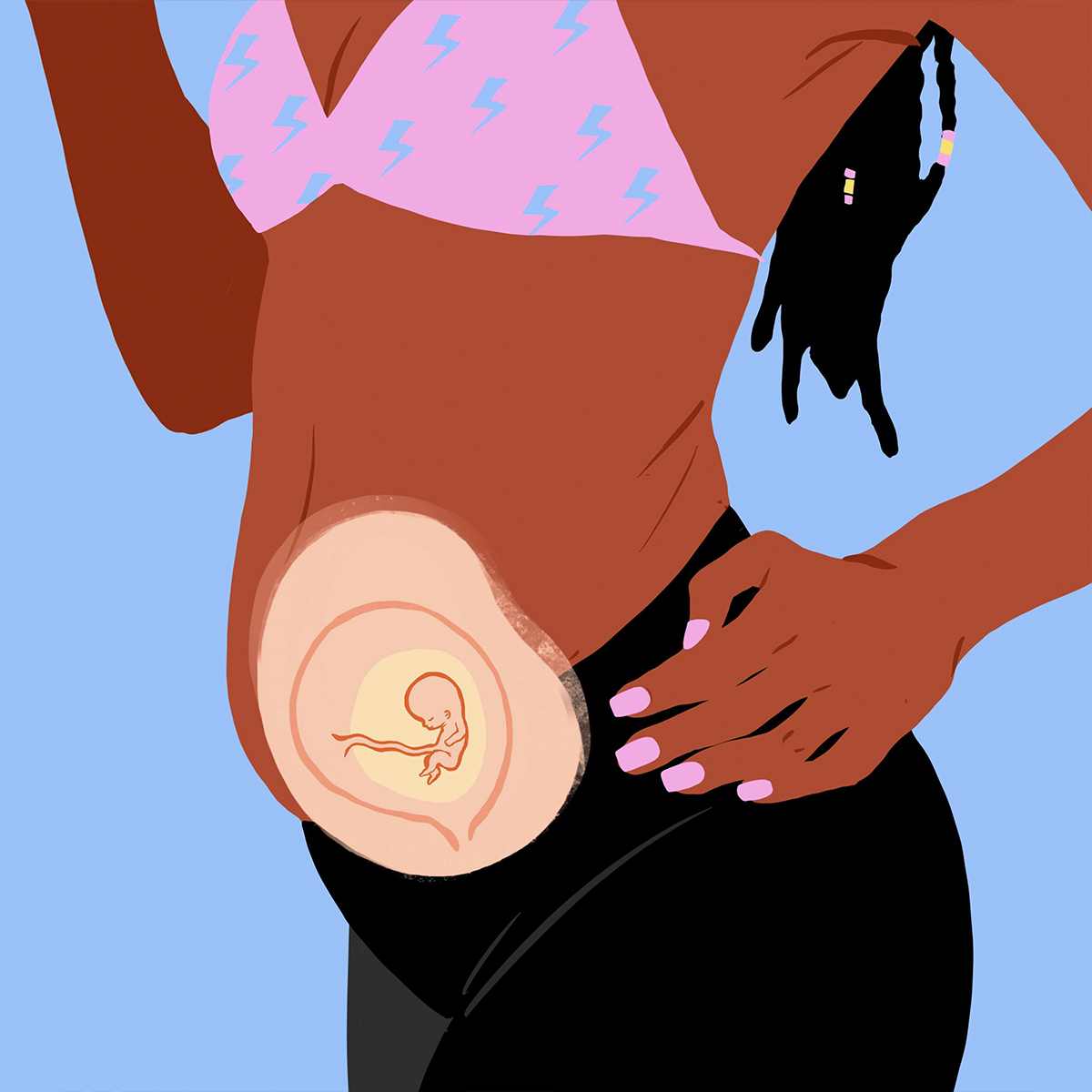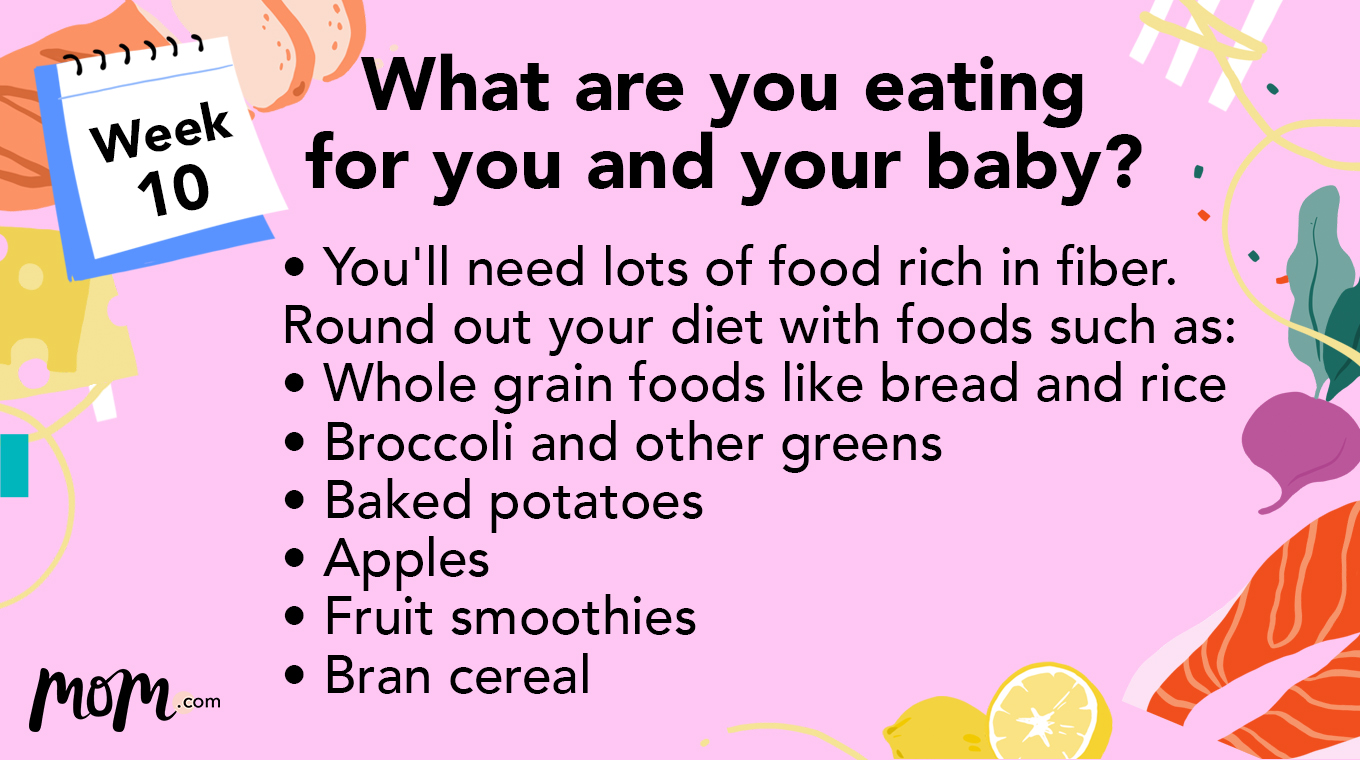
In this article
You’re 10 weeks pregnant!
Though some people feel connected as soon as the very first test is positive, for others, it takes a bit longer to sink in… and that 10 weeks might be when your pregnancy finally begins to feel real. At this point, you’re probably feeling at least a few symptoms, your first OB-GYN appointment is behind you, and if you haven’t already, you might be starting to plan how to share the big news with friends and family — so exciting!
As you begin the end of your first trimester, a lot is going on in your body (and with baby) this week. Read on for what you need to know this week.
Pregnancy symptoms at 10 weeks

At week 10, you might be feeling pretty sick, and that’s totally normal. One of the big ones? Fatigue. If you find you’re taking a nap almost every day and still feel tired, don’t worry — you’re not alone. And more importantly, don’t feel guilty about getting extra sleep; your body is growing a human! You need all the rest you can get.
“The first trimester is exhausting for most pregnant women. It take lots of energy to grow a new baby, not to mention all the changing hormones,” Dr. Kelly Kasper, an OB-GYN at Indiana University Health, told Mom.com.
Aside from all that sleepiness, you might be feeling a few other symptoms around this time that include:
Nausea
Unfortunately, this week is the continuation of any nausea you might have been feeling already. They call it morning sickness, but it can happen at any time of the day, and along with your nausea, you may also be experiencing vomiting, food aversions, and even food cravings, too.
Headaches
Thanks to your changing hormone levels, it’s possible that headaches and migraines will come into play. Drink plenty of water, since these can get worse if you’re dehydrated, especially if you’re having trouble keeping food down.
Mood swings
Hormone levels are to blame here, too. There’s a lot going on in your body, and that can mean that there’s a lot going on with your emotions, too.
Gas & bloating
You may find that nausea isn’t where your new tummy troubles end; many pregnant people continue to experience gas and bloating through that tenth week.
Increased vaginal discharge
Have we mentioned that hormones are causing a lot of issues this week? This time, it’s increased estrogen (along with increased blood flow) to blame if you’re experiencing more vaginal discharge than usual. This is called leukorrhea, and it’s very normal, though a bit annoying.
More visible veins
Speaking of that increased blood flow, you may notice that your veins are blue and more visible than usual, too. Your total blood volume will increase by about 45% while you’re pregnant, so this is just another sign your body’s doing what it’s supposed to do.
Round ligament pain
Some pregnant people will feel round ligament pain at this point as your baby and your uterus get bigger. Though round ligament pain is usually felt on the right side, it’s totally possible for it to be felt on the left, too, and might be especially noticeable when exercising, sneezing or coughing, or even changing positions in bed.
What does 10 weeks equal in months?
In week 10 of pregnancy, how many months along are you? You’re three months pregnant this week!
Your ultrasound
At this point, you probably won’t have an ultrasound — unfortunately, they usually only happen a few times during pregnancy unless something unusual arises. If you’ve already had a first trimester ultrasound to confirm your due date, you may not check in on baby again until the anatomy scan, which usually happens after the 16 week mark.
Your pregnant belly at 10 weeks

At 10 weeks, you might be seeing the start of a bump toward the bottom of your tummy… or you might not notice any change at all. Either way, it’s normal, and first time moms will likely have to wait a bit longer to see a change.
Pregnancy tips at 10 weeks
Unless you’re one of the lucky ones, this time in your pregnancy might have you feeling pretty crummy most of the time, but take heart: the second trimester is just a few weeks away, and many people find that things begin to get a little easier at that point. Until then, go with the flow. Nap when you can, and eat what you can when you can — while making sure you get plenty of nutrients for baby (and for you!)is the goal, morning sickness may be making that difficult.
“Eat anything that is appealing to you and not dangerous to baby, such as alcohol, raw animal foods, or cheese made from unpasteurized milk,” registered dietitian Elizabeth Ward told Cooking Light. “Also, don’t get dehydrated or let yourself get too hungry as this can make ‘morning sickness,’ which can actually last all day, worse.”
Take it easy, dress comfortably, and remember those prenatal vitamins. There’s a good chance you’ll be feeling much better soon!
Your pregnancy checklist at 10 weeks
This week, try to keep these items on your to do list:
- Decide whether or not you’re going to get the NIPT test, a blood test that screens for Down Syndrome and other chromosomal abnormalities, and can also tell you the sex of your baby — but be aware that, under age 35, this may not be covered by insurance
- Start shopping for maternity clothes if you haven’t already
- Think about how and when you want to tell your employer about your pregnancy and begin researching maternity leave policies
- Schedule your 12 week OB-GYN appointment.
What are you eating for you and your baby?

While you’re pregnant, eating to nourish your changing body and growing baby are the name of the game. At this point in your pregnancy, you’ll need lots of food rich in fiber to not only help with digestion but also to regulate blood sugar and lower your chances of high blood pressure or gestational diabetes. Like we said, morning sickness may make that feel impossible, but when making your grocery list, you should consider adding the following:
- Whole grain foods including bread and rice
- Broccoli and other greens
- Baked potatoes
- Apples
- Fruit smoothies
- Bran cereal
Remember to keep up that water intake, too!
When to call your doctor
In the first trimester, it can be hard not to feel anxious — all kinds of different things are happening in your body that may be totally unfamiliar to you, after all. Feel free to reach out to your OB-GYN if you’re concerned for any reason, but these are the signs that definitely warrant a call ASAP:
- You’re experiencing abnormal abdominal discomfort or cramping
- Bleeding of any kind
- Unusual vaginal discharge
- Pain or difficulty urinating
- Fainting or dizziness
- Severe vomiting
- A fever over 100 degrees Fahrenheit
Note: If you are visiting a medical professional during COVID, make sure to ask about the facility’s safety measures and confirm that they are following COVID protocols as indicated by the CDC.
Special Concerns: BIPOC Pregnancy
According to the American Journal of Managed Care, Black mothers are three times more likely to die in childbirth than white mothers in America. This is a terrifying, unfair, and sobering fact, but don’t let it scare you — instead, let it empower you to advocate for yourself through every stage of pregnancy, especially as the third trimester begins.
If you don’t feel like your OB-GYN is listening to you, it might be time to find a new one before you get too close to your due date, and plan to have someone by your side who will advocate for you while you give birth, too — whether that’s a partner, doula, or both.






